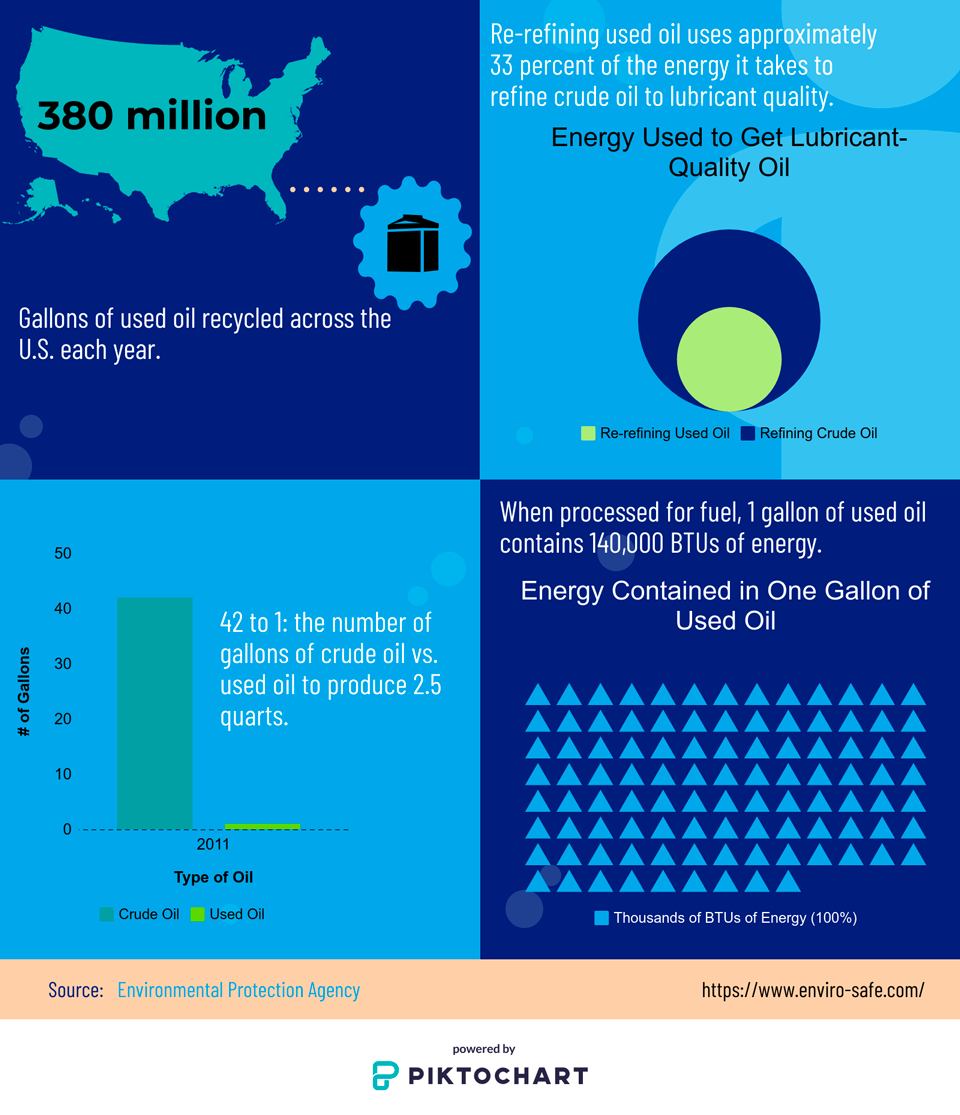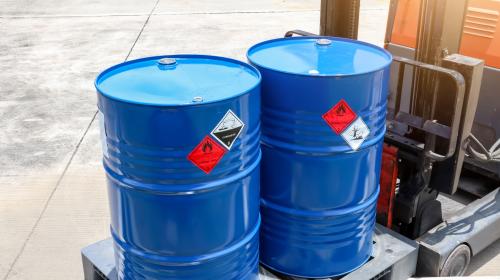380 million gallons: that is the number of gallons of used oil recycled across the U.S. in a given year. Recycling used oil promises many benefits for the economy, the environment, and your company’s bottom line. Re-refining used oil uses approximately 33 percent of the energy it takes to refine crude oil to lubricant quality. While it takes 42 gallons of crude oil to produce 2.5 quarts of high-quality lubricating oil, that number drops to a mere one gallon of used oil to produce the same amount of new lubricating oil. That same amount of used oil – one gallon – contains a staggering 140,000 BTUs of energy when processed for fuel.
Used oil recycling is more than just good business; it’s also required in states like Wisconsin. But there are some common mistakes generators make when it comes to used oil recycling. Follow our best practices guide and avoid mistakes that could cost your company in lost opportunities and state and federal regulatory violation fees from improper waste oil management procedures.

What Is Used Oil?
The EPA defines “used oil” as: any petroleum-based or synthetic oil that has been used. That definition is deceptively simple, so here is a more comprehensive list of what the EPA defines as used oil (and what it is not):
Used oil is:
- Used synthetic oil – usually derived from coal, shale, or polymer-based starting material
- Used engine oil – includes gasoline or diesel engine crankcase oils and piston-engine oils for automobiles, trucks, airplanes, boats, locomotives and heavy equipment
- Used transmission fluid
- Used refrigeration oils
- Used compressor oils
- Used metalwork fluids and oils
- Used laminating oils
- Used industrial hydraulic fluid
- Used copper and aluminum wire drawing solution
- Used electrical insulating oil
- Used industrial process oils
- Oil used as buoyant
Used oil is not:
- Waste oil that is bottom clean-out waste from virgin fuel storage tanks, virgin fuel oil spill cleanups, or other oil wastes that have not been used
- Antifreeze and kerosene
- Vegetable oil and animal oil (note: Enviro-Safe Resource Recovery can recycle these oils, but they are considered cooking oil, not classified as used oil)
- Petroleum distillates used as solvents
Generators should note that oils that do not meet the EPA’s definition of used oil can pose a threat to the environment when disposed of and could be subject to RCRA regulations for hazardous waste management.
How Can Used Oils Be Recycled?
When working with a company like Enviro-Safe, a facility that is fully insured and permitted as a transfer, storage and recycling facility, your recycled used oil can be used again for the same task or can be used for a new purpose. Used motor oil can be re-refined and impurities removed so it may be used again as motor oil or processed as furnace fuel oil. Re-refining is our preferred, best option since it prolongs the life of the oil resource forever. It closes the recycling loop and uses less energy and preserves virgin oil. Oil filters can be recycled as scrap metal if the filters are punctured, then used oil is drained into an appropriate container and recycled with used oil. Aluminum rolling oils can also be filtered and used again. Used oil can be used as a feedstock into refinery production processes. To learn more about your options for recycling used oil, contact us today. Because we are a nimble company with many partnerships and vast network across the Midwest, we are able to tailor used oil recycling options that are best for your company rather than giving you a one-size-fits-all solution.
Used Oil Recycling Best Practices
Whether you are just beginning your used oil recycling program or want to make sure your storage, transportation and recycling company is using best practices and following standard used oil management procedures, (and you are in compliance), take a moment to review our best practices guide (note: these best practices are applicable in Wisconsin. Your local and state authorities will also have its own regulations and may be more strict than EPA requirements, so be sure to check your state environmental agencies. The Wisconsin used oil recycling and management standards can be found in Chapter NR 679.)
- Use a transporter that has an EPA identification number to ship used oil off-site. Keep in mind that the EPA uses 12-digit identification (ID) numbers to track used oil. Transporters that haul used oil must have a valid EPA ID number, so if you work with a transporter, the first step is to make sure they are fully permitted. We also recommend double checking their insurance, since the generator is ultimately held responsible for any accidents from “cradle to grave”. (Check out our post “Top 10 Tips for Selecting a Hazardous Waste Transporter” for more information on permits and insurance).
- Store used oil in structurally-sound and closed containers, such as 55-gallon closed-top drums. Used oil may not be stored in units other than tanks and containers. Containers and above ground tanks used to store used oil at generator facilities must be: (a) In good condition (no severe rusting, apparent structural defects or deterioration). (b) Not leaking (no visible leaks).
- Keep containers closed when not adding used oil
- Keep accurate records. Designate someone to keep track of your Bill of Lading, date, amounts, transporters, etc.
- Allow only site attendants to add used oil to the container to make sure there is no mixing of other fluids. If non-oil liquids are added, the entire container may no longer be recyclable.
- Label containers and tanks as “Used Oil” – do not label as “Waste Oil.” Used oil and waste oil are not the same substances in hazardous waste regulations.
- You may burn used oil that you generate in your own used oil burner. Do not send the oil to a third party to be burned in their oil burner.
- If oil spills, use absorbent materials to clean the spill up immediately. Store the oil-soaked materials in a leak-proof, labeled container and send it away with the used oil. Consult Enviro-Safe’s health & safety experts for assessments, employee training and consulting.
If you are seeking new, better and more cost-effective solutions for your used oil recycling, consider working with Enviro-Safe Resource Recovery. We would love to offer you a tour of our state-of-the-art facilities in Germantown, Wisconsin. Contact us today for your free tour.



